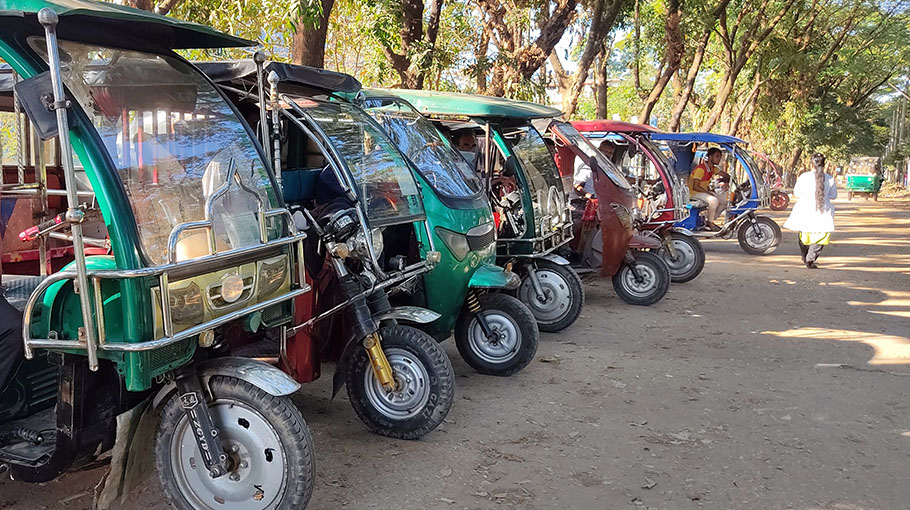Auto-rickshaw drivers at SUST demand fare hike

From the main gate of Shahjalal University of Science and Technology (SUST) passengers are ferried by battery-powered auto-rickshaws to the three male halls of the University and two female halls and also various places on the campus. For this, the fare fixed only five taka a century ago still exists. As a result, auto-rickshaw drivers are struggling to run their families on this fare due to the rising market of commodity prices.
On Sunday afternoon, it was seen that a total of 49 auto rickshaw (battery operated) were carrying passengers from the auto stand at the main gate of the university. 47 of them are currently serving and the remaining two are in the workshop for renovation. These auto-rickshaws carry passengers serially. The passengers of these auto-rickshaws are university teachers, students, officers, employees, their families or external visitors. The drivers who drive auto rickshaws on a fare have to pay 300 taka per auto and an electricity bill of about 180 taka daily to the rickshaw owner. After paying this money, the family has to run with what is left.
From the main gate of the university, the driver gets a fare of five taka per person to drop off the passengers anywhere in the campus. Some also give ten taka for humanitarian consideration. But this scenario does not happen to everyone. Farthest from the main gate is the Syed Mujtaba Ali Hall. Although there is an auto stand there, rickshaw movement depends on the passenger. But such a scenario is not often seen. Auto-rickshaw drivers claim that in most cases they get only 5 taka as fare. Besides, if someone has traveled to Bangabandhu Sheikh Mujibur Rahman Hall, if he feels happy than pays 5 taka more as fare. But it’s not a regular scenario on this campus.
A different scenario is seen in the case of ordinary rickshaws (foot driven). In these rickshaws from the main gate to the campus roundabout, one person has to pay a minimum of 10 taka, two people have to pay a minimum of 15 taka. However, sometimes the driver's charge exceeds 50 taka or 100 taka. In fact, the boys have to pay a minimum of 25 taka to 50 taka if they travel to Shahparan in this rickshaw. At night the fare increases at a geometric rate.
Another different scenario of price increase is seen in the sale of tea and seasonal Flapjack (Pitha). Last year, milk-tea and color-tea were sold at 5 taka in the tea stall of the campus, but currently the price of milk tea has increased by 2 taka and is sold at 7 taka. This view also exists for seasonal Flapjack (Pitha).
A second-year student of the Public Administration Department named Masud Rana said that everything is increasing in price.
The fare of auto drivers can be increased a little. However, drivers should be careful not to misbehave with anyone if they don't have a problem.
If we go by rickshaw, we have to pay more than 10 taka. In that case, the increase in auto-rickshaw fare needs to be considered.
An assistant professor of the same department named Sabina Yasmin said, "When I was a student of this campus, I used to pay 5 taka after traveling by auto-rickshaw. But now sometimes I take reserve. I paid more than the full fare. Besides, I try to increase the fare even if I go with others. The price of goods is increasing, accordingly their fare can be increased but it should be favorable.
An auto rickshaw driver named Noman Mia has been driving an auto-rickshaw for the past 15 years. This auto-rickshaw is the only source of income for his family of five members. It is also run on rent. He has to pay 480 taka per day to the auto owner. After paying .480 taka from the daily earnings, the family has to run with what is left. This money also covers the cost of his children's education.
Noman Mia said, "We have been providing facilities for 5 taka for many years. But the rate of daily demand for commodities is increasing day by day. University students talk about the common people of the country. Works for common people. Therefore, considering the current market price, if they think a little about our auto-rickshaw fare, then some solvency will return to our family.
The assistant proctor of the university named Mohammad Javed Qaiser Ibne Rahman said that the auto drivers have been applying for the fare increase for a long time.
As the prices of daily commodities have gone up, they also need to consider the increase in fare. Now we have to think that a certain amount of fare should be fixed so that neither the student nor the auto driver
is unhappy.



